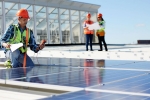Strengthening economic growth, PUPR boosts infrastructure development
This article has been translated by PwC Indonesia as part of our Indonesia Infrastructure News Service. PwC Indonesia has not checked the accuracy of, and accepts no responsibility for the content.
Investor Daily - Perkuat pertumbuhan ekonomi, PUPR kebut pembangunan infrastruktur
18 January 2023
Jakarta – The Public Works and Housing (PUPR) Ministry is continuously strengthening economic growth and supporting investment in regions by accelerating infrastructure construction. This is a follow up to President Joko Widodo’s direction who emphasised the importance of extra effort in controlling inflation, which includes interregional cooperation expansion, food distribution mobilisation and facilitation, and food production increase.
“Domestic investment in 2022 outside Java reached 53%. Equity was achieved thanks to the many infrastructures constructed outside Java. From the Rp1,200 trillion target, our investment in 2022 reached Rp1,207 trillion. So, investment is our key for economic growth,” President Jokowi said in his opening speech at the Regional Head National Coordination Meeting and Regional Leadership Communication Forum (FORKOPIMDA) held by the Home Affairs Ministry at Sentul International Convention Centre on Tuesday (17/1/2023).
During panel session II at the Regional Head National Coordination Meeting and FORKOPIMDA, PUPR Minister Basuki Hadimuljono said that infrastructure played a role in controlling inflation by guaranteeing food supply and raw materials through dams, irrigation networks, and irrigation network rehabilitation.
“Currently, out of 61 dams, 38 have been inaugurated by President Jokowi. New irrigated farmlands in 2022 reached 255,015 ha, while irrigation network rehabilitation reached 3.84 million ha. The task of regional governments is to provide tertiary networks so that rice production can improve,” Minister Basuki said in his official statement in Jakarta on Tuesday (17/1/2023).
Minister Basuki also said that infrastructure construction also played a role in facilitating food and raw material distribution through toll road and non-toll road construction, flood control to facilitate transportation through dam construction, flood control and beach protection, as well as production road construction.
“Distribution also affects inflation and investment. Until 2022, new toll road construction and operation reached 1,850 km. Inshallah (God willing), in 2024, 2,697 km of toll roads are set to be connected. So, the total length of toll roads in 2024 will reach 3,490 km,” Minister Basuki added.
Then, from 2015 to 2021, non-toll road construction reached 4,819 km. In 2022, 846 km was completed, so the total length of national roads from 2015 to 2022 reached 5,665 km.
Production road construction is carried out to facilitate farmers in carrying commodities through the Regional Socio-Economic Infrastructure Development (PISEW) program with participation from the public.
“The PISEW program is carried out to make regional economic investment through infrastructure construction in villages. Besides that, it will also reduce extreme poverty and battle stunting. Various programs are carried out to provide and improve infrastructure with the public’s participation. Starting from upgrading houses through BSPS to providing clean water and sanitation. After the infrastructures are repaired, the Social Affairs Ministry will come to provide empowerment. With consolidated programs, we can battle stunting and extreme poverty,” Minister Basuki explained.
















